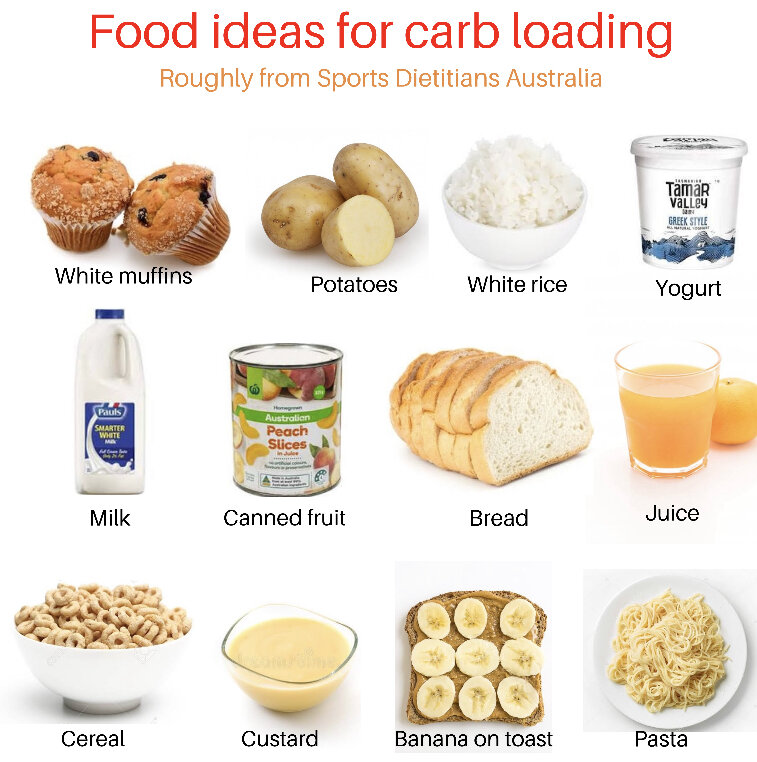NUTRITION FOR SPORTS PERFORMANCE: Carb Loading...
I think we have all heard the term “carb loading” before, but when do we need to do it? how do we do it properly? Isn’t it just eating a big bowl of pasta the night before an event? or is there more to it than that?
There are a few things you should consider before carb loading:
1- the type of event and duration of that event
2-physique requirements- if you have a certain weight category you need to stay in for the big event
3-timing (how many days until the big event?)
4-Blood sugar changes- if you have diabetes , you should consult with your GP or a accredited practicing dietitian
5-Gender
Carbohydrates are the bodies preferred source of energy and the most important source of energy for athletes. Carbs are essential due of our muscles limited ability to oxidise fat for energy.
Our bodies can only store enough glycogen to sustain around 90 minutes of exercise. Beyond this, without sufficient fuel, energy levels drop. Carb loading aims to increase our glycogen stores in order to postpone fatigue and extend steady state by approximately 20% in endurance events lasting more than 90 minutes.
Carb loading would benefit athletes doing marathons and other endurance events to boost their muscle (and liver) glycogen stores to optimise their performance. In fact, carbohydrate loading has been shown to improve performance over a set distance by 2-3%
How much carbohydrate do I need and how long do I need to load for?
Carbohydrate loading should take place over the 1-3 days (24-72 hours) leading up to race day (there’s no benefit to doing it any longer).
The exact quantity varies between individuals, but typically on each day of loading, male athletes require ~7-10g of carbohydrate per kilogram body weight (~525-750g carbohydrate per day for a 75kg athlete).
Females generally require slightly less, usually ~5-8g of carbohydrate per kilogram body weight each day that they are loading (~300-480g carbohydrate per day for a 60kg athlete).
This is more used for athletes about to run a marathon or other huge endurance events such as a tennis tournament or long-distance cycling, but if it is just prior a general sporting game, then this can be done just on a SMALLER SCALE.
A small scale could be loading for 1 day prior and reducing your activity levels prior, but don’t over do it as eating excessive carbs will make you feel sluggish and bloated and can affect your sleep (especially if you eat excessive amounts before bed) which is not ideal for your performance. As carbs store water along with it in the muscles, eating excessive amounts may also leave you feeling heavy and slow rather than light and agile.
There are numerous ways that you can meet your carb targets, pasta, bread, rice, potato, yoghurt, custard, juice, yoghurt and white muffins/cakes are just some of the many options you could consider. Choosing foods lower in fibre and fat will help to minimise your chances of gut discomfort (easy to digest) to ensure they still feel light and agile.
You should also note that carb loading is not an excuse to gorge on everything in sight. Carbs rich foods is the goal not more food. Eating large amounts of high fat foods can compromise your carbohydrate intake leading to suboptimal fuelling, gut discomfort, and poor performance.
Is it true that carb loading makes you gain weight?
Carb loading can potentially lead to a short-term weight gain of 1-2kg. If this happens to you don’t panic! This weight is from the extra water and glycogen stored in your muscles and can be a good sign that your loading is on track. This ‘weight gain’ is only temporary.
A carb loading diet can cause some discomfort or side effects, such as:
· Digestive discomfort. You may need to avoid or limit some high-fibre foods one or two days before your event. Beans, bran and broccoli can cause gassy cramps, bloating and loose stools. Eating high fibre or even high fat foods may make the athlete feel sluggish, bloated and heavy which can decrease performance.
· Blood sugar changes. Carbohydrate loading can affect blood sugar levels. If you have diabetes as mentioned above, monitor your blood sugar during training or practices to see what works best for you. And talk to your dietitian or doctor to make sure your meal plan is safe for you.
Each athletes carbohydrate needs will be different and it’s important to practice what amount works well prior to an event.
Summary:
-carb loading depends on your event, body composition, and typical eating patterns
-it is beneficial to have carbohydrate focussed meals the day/night before a game to ensure your glycogen stores are topped up
-when carb loading aim for lower fibre and lower fat sources








